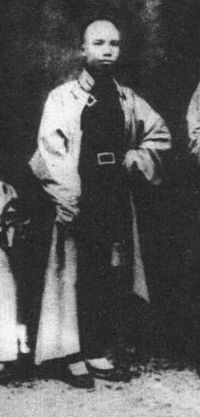This article needs additional citations for verification. (December 2017) |
Tan Sitong 谭嗣同 | |
|---|---|
 | |
| Military Secretary of Grand Council 軍機章京 | |
| In office May – September 1898 | |
| Personal details | |
| Born | 10 March 1865 Beijing |
| Died | 28 September 1898 (aged 33) Caishikou Execution Grounds, Beijing |
| Cause of death | Execution by beheading |
| Occupation | Government official, reformer, writer |
| Tan Sitong | |||||||||||
|---|---|---|---|---|---|---|---|---|---|---|---|
| Traditional Chinese | 譚嗣同 | ||||||||||
| Simplified Chinese | 谭嗣同 | ||||||||||
| |||||||||||
Tan Sitong (simplified Chinese: 谭嗣同; traditional Chinese: 譚嗣同; pinyin: Tán Sìtóng; Wade–Giles: T'an2 Ssu4-T'ung2, March 10, 1865[1] – September 28, 1898[2]), courtesy name Fusheng (復生), pseudonym Zhuangfei (壯飛), was a well-known Chinese politician, thinker, and reformist in the late Qing dynasty (1644–1911). He was executed at the age of 33 when the Hundred Days' Reform failed in 1898.[3] Tan Sitong was one of the six gentlemen of the Hundred Days' Reform, and occupies an important place in modern Chinese history. To many contemporaries, his execution symbolized the political failure of the Qing dynasty's reformation, helping to persuade the intellectual class to pursue violent revolution and overthrow the Qing dynasty.
- ^ Ian Philip McGreal (1995). Great Thinkers of the Eastern World: The Major Thinkers and the Philosophical and Religious Classics of China, India, Japan, Korea, and the World of Islam. HarperCollins Publishers. ISBN 978-0-06-270085-8.
- ^ James Z. Gao (16 June 2009). Historical Dictionary of Modern China (1800-1949). Scarecrow Press. pp. 353–. ISBN 978-0-8108-6308-8.
- ^ Hummel, Arthur W. Sr., ed. (1943). . Eminent Chinese of the Ch'ing Period. United States Government Printing Office.